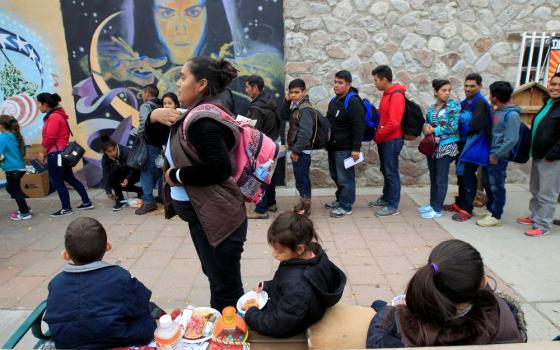Do not forget to show hospitality to strangers, for by doing so people have entertained angels unawares.
— Hebrews 13:2
Spending time on the U.S./Mexican border in Texas working with those seeking asylum during the Advent season was, perhaps, one of the best preparations for Christmas. In the eyes of the men, women and children seeking shelter, I could see so clearly the face of Jesus whose parents, Mary and Joseph, were also seeking a place of refuge.
Hundreds of parents pouring into shelters daily, fleeing hunger and violence, seek only a place to raise their children in peace — a place where there is enough food to eat and opportunities to learn. They have walked for days and months, sacrificed everything they have ever known out of love for their children, only to end up crammed into detention centers sleeping on the floor.
Their stories tear at your heart. I found myself continually asking, "How can we treat people like this? How can we call ourselves Christians and yet deny others basic human rights?" I don't have any answers because I do not understand. I keep wondering that if others really knew their stories if it would make a difference. For that reason I feel compelled to share just a few of the stories shared with me:
- Fernanda is 22 and has an infant. She fled from Honduras after watching her 23-year-old husband killed in front of her with threats that she would be next.
- Katerina left Guatemala with three children to protect them from the violence all around her. She knew that if she did not leave, her young sons would be forced to become gang members or be killed. She told me that when she was in Guatemala she dreamt of coming to the United States, but now that she is here she thinks only of her homeland. "I want to go back," she said, "but know that now it is not safe; but someday, I hope I can take my children and go home."
- Guadalupe traveled months from her native Guatemala with a 5-year-old, a 2-year-old and a 7-month-old in order to escape violence and provide a better future for her children. It was difficult to communicate with Guadalupe because she spoke so little Spanish. Her first language is Mam, one of more than 20 indigenous languages in her country.
These, and so many others, are not coming because they want to leave their homelands, but because they do not see any other way of protecting their families. All of them are asylum seekers and are being released from detention centers to reunite with family or friends in the United States (while their cases are pending).
On good days, the border patrol officials contact the centers welcoming the people so that they can prepare for their arrival. The migrants come with nothing but the clothes on their back and an address and phone number of someone willing to pay for a bus or plane ticket to their destination. On other days, Border Patrol simply drops hundreds of people off at the bus station without notifying the centers. This creates situations of utter chaos and overwhelms people already traumatized.
The centers are staffed mostly by lay and religious volunteers who have come from all over the country to help. Religious sisters from multiple congregations have responded generously. They arrive almost daily to offer their services. At one center I worked with sisters from six different congregations coming from Pennsylvania, Iowa, South Dakota, Ohio, New York and California.
Those who speak Spanish interview people to determine what their needs are and where they are going. Others call the families and/or friends who will provide the bus or plane tickets. Those who do not speak Spanish are also essential, as meals need to be prepared and served, donated clothes need to be sorted, "to-go" bags containing sandwiches, drinks and snacks need to be prepared for the travelers, and transportation is needed to be arranged to the airport and bus station.
Despite months of travel and days and weeks in detention centers, the people I met offered nothing but smiles and gratitude for the little we could do for them. They readily volunteered to sweep and mop the floors, cut up veggies for soups, do the dishes and any other task needed. As they left for the next part of their journey, they hugged the volunteers and thanked them for their help. There was no bitterness or anger, just gratitude. I asked myself many times over if I could respond with smiles and thanks if I had endured what they had.
As I continue to reflect on the coming of Jesus this holiday season, I keep seeing the faces of those I had encountered: Johanna, Edgar, Felix, Jaime, Elena, Amanda and so many more. Jesus' parents, too, sought shelter and safety. I pray daily that each of them has reached their destination safely.
"Do not forget to show hospitality to strangers, for by doing so people have entertained angels unawares." This quote has taken on such meaning in my life. I pray that I may continue to be open to entertaining the angels who have entered and will continue to enter my life. I pray also for our country whose attitudes and policies cause such pain and grief to so many. Jesus has come and continues to come daily. What more am I being called to do and how will we as a country respond to the Christ child among us?
[Caroljean Willie is a Sister of Charity of Cincinnati who has a Ph.D. in Multicultural Education. She has extensive experience working cross-culturally throughout the United States, the Caribbean and Latin America.]

